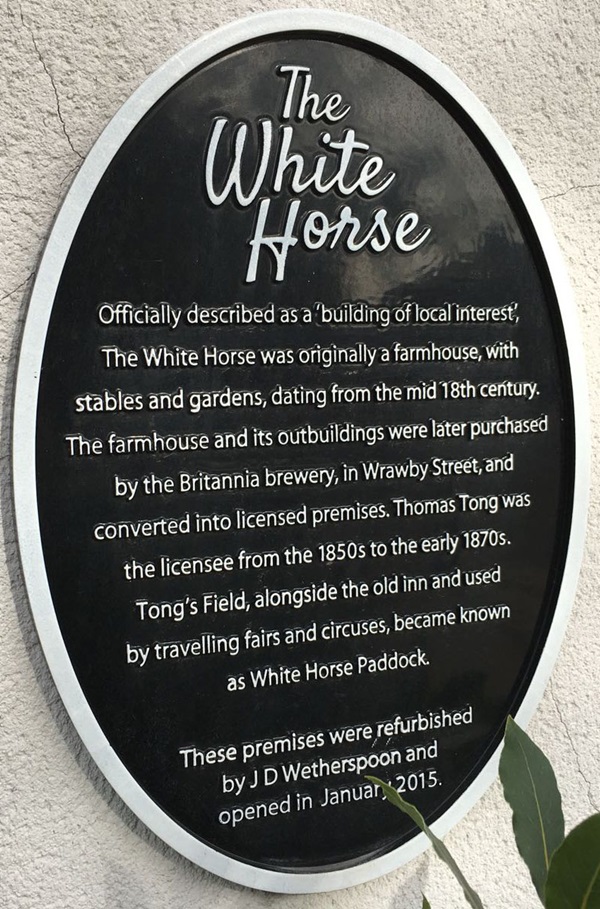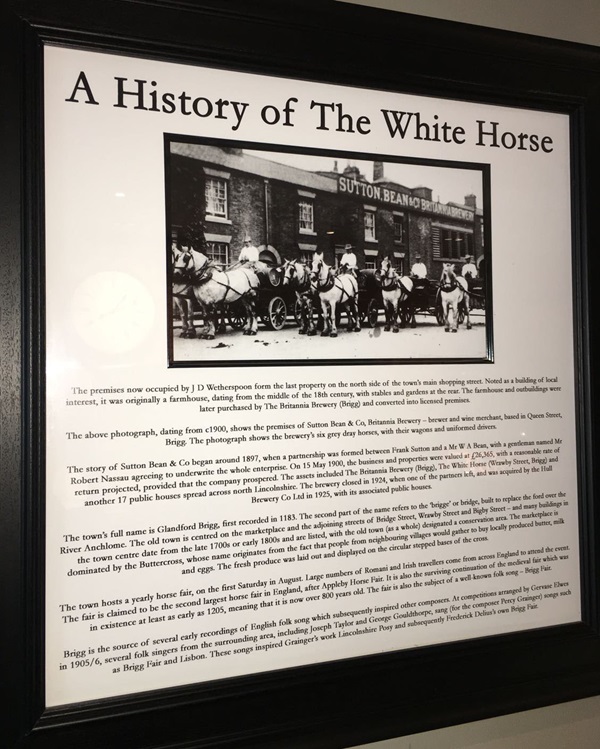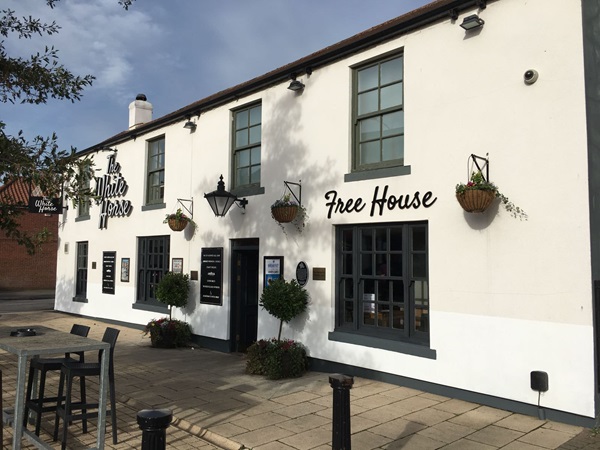Wrawby Street, Brigg, North Lincolnshire, DN20 8JR
Noted as ‘a building of local interest’, this was originally a farmhouse, dating from the mid 18th century, with stables and gardens to the rear. The farmhouse and outbuildings were later bought by the Britannia brewery, in Wrawby Street, and converted into licensed premises. The brewery closed in 1924, but the Britannia public house has survived.
A plaque documenting the history of The White Horse.

The text reads: Officially described as ‘a building of interest’, the White Horse was originally a farmhouse, with stables and gardens, dating from the mid-18th century. The farmhouse was its outbuildings were later purchased by the Britannia Brewery, in Wrawby Street, and converted into licensed premises. Thomas Tong was the licensee from the 1850s to the early 1870s. Tong’s Field, alongside the old inn and used by travelling fairs and circuses, became known as White Horse Paddock.
These premises were refurbished by J D Wetherspoon and opened in January 2015.
A photograph and text about The White Horse.

The text reads: The premises now occupied by J D Wetherspoon form the last property on the north side of the town’s main shopping street. Noted as a ‘building of local interest’, it was originally a farmhouse, dating from the middle of the 18th century, with stables and gardens at the rear. The farmhouse and outbuildings were later purchased by The Britannia Brewery (Brigg) and converted into licensed premises.
The above photograph, dating from c1900, shows the premises of Sutton Bean & Co, Britannia Brewery – brewer and wine merchant, based in Queen Street, Brigg. The photograph shows the brewery’s six grey dray horses, with their wagons and uniformed drivers.
The story of Sutton Bean & Co began around 1897, when a partnership was formed between Frank Sutton and a Mr WA Bean, with a gentleman named Robert Nassau agreeing to underwrite the whole enterprise. On 15 May 1900, the business and properties were valued at £26,365, with a reasonable rate of return projected, provided that the company prospered. The assets included The Britannia Brewery (Brigg), The White Horse (Wrawby Street, Brigg) and another 17 public houses spread across north Lincolnshire. The brewery closed in 1924, when one of the partners left, and was acquired by the Hull Brewery Co Ltd in 1925, with its associated public houses.
The town’s full name is Glandford Brigg, first recorded in 1183. The second part of the name refers to the ‘brigge’ or bridge, built to replace the ford over the River Ancholme. The old town is centred on the marketplace and the adjoining streets of Bridge Street, Wrawby Street and Bigby Street – and many buildings in the town centre date from the late 1700s or early 1800s and are listed, with the old town (as a whole) designated a conservation area. The marketplace is dominated by the Buttercross, whose named originates from the fact that people from neighbouring villages would gather to buy locally produced butter, milk and eggs. The fresh produce was paid out and displayed on the circular stepped bases of the cross.
The town hosts a yearly horse fair, on the first Saturday in August. Large numbers of Romani and Irish travellers come from across England to attend the event. The fair is claimed to be the second largest horse fair in England, after Appleby Horse Fair. It is also the surviving continuation of the medieval fair which was in existence at least as early as 1205, meaning that it is now over 800 years old. The fair is also the subject of a well-known folk song – Brigg Fair.
Brigg is the source of several early recordings of English folk song which subsequently inspired other composers. At competitions arranged by Gervase Elwes in 1905/6, several folk singers from the surrounding area, including Joseph Taylor and George Gouldthorpe, sang (for the composer Percy Granger) songs such as Brigg Fair and Lisburn. These songs inspired Grainger’s work Lincolnshire Posy and subsequently Frederick Delius’ own Brigg Fair.
External photograph of the building – main entrance.

If you have information on the history of this pub, then we’d like you to share it with us. Please e-mail all information to: pubhistories@jdwetherspoon.co.uk